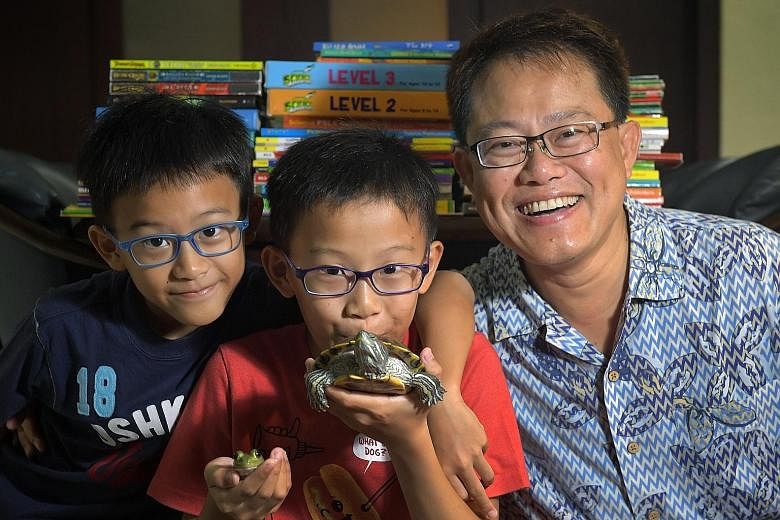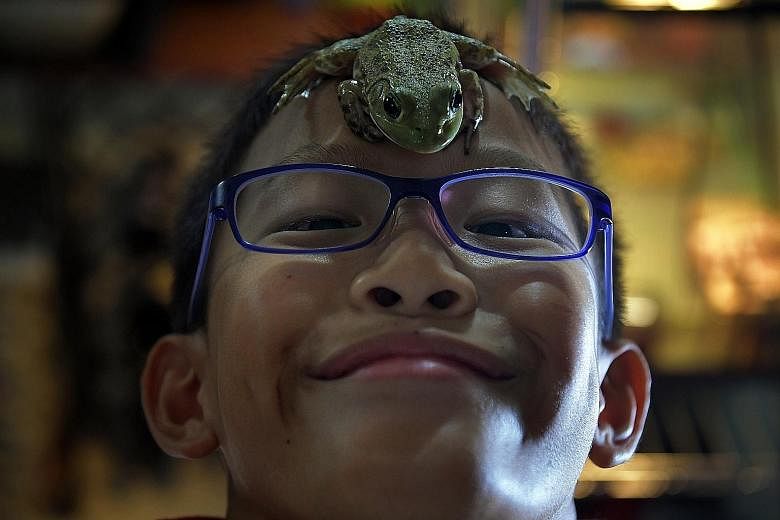Ask Kieran Lee, 11, what he would like his day to be like and he says he wishes that homework time can be capped at just an hour.
But no, school need not be cancelled. He said: "I know studying is good for us. It is supposed to help train our brains. If we don't study, we will become mindless zombies walking around.
"I just want an hour of homework. Otherwise, it piles up and when I look at the stack of work, I feel very stressed out."
The value he accords homework and grades is mirrored by other students and their parents. Still, they add the proverbial "but", because stress among children is becoming a real headache.
A recent study by the Organisation for Economic Cooperation and Development (OECD) confirms their concerns. Singapore students were found to have higher levels of anxiety about their tests and grades than their international peers.
This leads to the next issue - a spike in the number of children seeking professional help to cope with stress.
Again, Kieran's reaction to stress is typical. His father, Mr Alvin Lee, 52, said the boy does not usually verbalise his stress. "With the local education scene being what it is, I know he will feel stress and that he needs some outlets," he said.
"He has sailing lessons. I take him and his brother to farms and rural areas. I bought him pets as well. In fact, he told me he wants to be a snake handler. As a parent, my part is to fulfil this side of him beyond his academics."
Others seek counselling.
Psychologist Daniel Koh of the Insight Mind Centre used to see just one or two students with school-related anxiety five years ago. But the number has grown to about eight a year, or a total of 40 cases over the past five years.
Mr Koh said: "Those affected are getting younger - we even have lower-primary students. They are there because they have verbalised their own study-related stress or their family members pick it up."
Mr Philip Ang, a psychologist of 20 years, said that at every stress management talk he has conducted in schools, 70 per cent to 80 per cent of the cohort raise their hands whenever he asks who feels stressed.
Three of five psychiatrists and psychologists in private practice The Sunday Times spoke to said that they are seeing up to 50 per cent more cases today, compared with about five years ago.
While the stigma of mental health needs has been removed, which could explain some of the increase, the experience and stories from these practitioners mirror the findings of the OECD study which surveyed 5,825 Singapore students.
For example, 86 per cent of Singapore students were worried about poor grades at school, compared with 66 per cent of students across all OECD countries. The study polled 540,000 students from 72 countries and economies.
Stress can trigger anxiety and depression, and cause sleep problems, social withdrawal, angry outbursts, obsessive compulsive behaviour and, in some cases, self-harm.
Resilienz Clinic's consultant psychiatrist and medical director, Dr Thomas Lee, said academic-related stress is often the culprit. The clinic sees around 10 to 15 students who need mental health treatment every month. The figure includes repeat clients.
Dr Lee said a lot of fear and anxiety is pinned to major exams such as the O levels and A levels, "since students believe this will have a major impact on their later life".
The Ministry of Education (MOE) said it has set up structures to facilitate the deployment of school counsellors to provide social and emotional support for students who require assistance. It is also tweaking the Primary School Leaving Examination scoring system, to come into effect from 2021, and has stopped naming top scorers.
But it added: "Research has shown that stress at appropriate levels can be a motivating force to energise us for the challenges we face.
"While we are encouraged that our students are highly motivated to learn and achieve, we are cognisant that this must not come at the expense of their well-being. Hence, we put in much effort to help students understand the meaning of their learning, instead of just focusing solely on their achievements."
But some children might feel the need to fight and perform, said Mr Ang. "Children also put pressure on themselves - especially the self- motivated ones - to achieve excellence," he said.
Dr Lim Choon Guan, deputy chief and senior consultant at the Institute of Mental Health's (IMH) department of child and adolescent psychiatry, said that students are also attending enrichment classes and standards are, in turn, raised.
Clinical psychologist Carol Balhetchet said: "We are a performance-oriented country in whatever age group or phase of our life. This starts from young."
Three in four students she treats are in for study-related stress.
The Singapore Children's Society Tinkle Friend Helpline and Online Chat have received about 480 phone calls and online chats each year since 2014 about school-related issues.
IMH told The Sunday Times that of the 3,000 new outpatient cases for children and adolescents aged six to 18 years its Child Guidance Clinics saw between 2011 and 2016 each year, under 30 per cent were diagnosed with stress-related disorder, anxiety disorder and/or depression. This number has been stable for the past 10 years.
Management consultant Sanjay Patel, 52, said that when his two children, aged 11 and 12, get stressed, they become short-tempered and are sometimes unable to sleep. To help his son Jay combat stress, he signed him up for tennis lessons three weeks ago.
Mr Patel said: "I would dearly like the system to undergo a holistic change. But for now, as parents, we have to figure out how to cope... Our childrens' lives are largely consumed by school."



